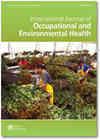Loss to five-year follow-up in the Telemark study
Q2 Medicine
International Journal of Occupational and Environmental Health
Pub Date : 2019-09-28
DOI:10.1183/13993003.congress-2019.pa4451
引用次数: 0
Abstract
Objectives: Studies have shown that declining participation in epidemiological studies may lead to biased estimates of occurrence and selection bias. Nevertheless, studies on non-participation and loss to follow-up in prospective studies are rare. Aim: The aim of the study was to characterize those lost to follow-up and possible factors associated with non-participation in a prospective population based study of respiratory health in Norway. Methods: A five-year follow-up of the population based sample (n=16 099), aged 21-55 years, from the Telemark study was conducted in 2018. Risk factors associated with loss to follow-up were assessed by forward conditional logistic regression. Results: A total of 8 244 (51.2%) participants were lost to follow-up. Non-participation was associated with male sex, younger age, low education, current smoking, unemployment, reduced workability, asthma, being woken by chest tightness and COPD. Conclusion: The risk factors for participants lost to five-year follow-up are comparable to those reported in population-based studies for non-responders, mainly related to younger age, male gender, current smoking, low socioeconomic status, and higher symptom prevalence and morbidity.在Telemark研究中进行了五年的随访
目的:研究表明,参与流行病学研究的人数减少可能导致对发生率和选择偏倚的估计有偏倚。然而,关于前瞻性研究中未参与和随访缺失的研究很少。目的:本研究的目的是描述挪威一项前瞻性基于人群的呼吸健康研究中失去随访者的特征以及与未参与相关的可能因素。方法:2018年,对来自Telemark研究的21-55岁的人群样本(n= 16099)进行了为期五年的随访。通过前向条件逻辑回归评估与随访损失相关的危险因素。结果:共失访8 244例(51.2%)。不参与研究与男性、年龄较小、受教育程度低、目前吸烟、失业、工作能力下降、哮喘、因胸闷和慢性阻塞性肺病而醒来有关。结论:失去5年随访的参与者的危险因素与无应答者的基于人群的研究报告的危险因素相当,主要与年龄较小、男性、目前吸烟、低社会经济地位以及较高的症状患病率和发病率有关。
本文章由计算机程序翻译,如有差异,请以英文原文为准。
求助全文
约1分钟内获得全文
求助全文
来源期刊

International Journal of Occupational and Environmental Health
医学-公共卫生、环境卫生与职业卫生
CiteScore
2.70
自引率
0.00%
发文量
0
审稿时长
>12 weeks
期刊介绍:
Cessation. International Journal of Occupational and Environmental Health ( IJOEH) is an authoritative, interdisciplinary resource covering occupational health, environmental health, and consumer health (the aspects of human disease and injury that are determined or influenced by exposure to consumer goods and their components, including pharmaceuticals, food additives, and other purchased products). It publishes original scientific and social scientific research, as well as commentary and analysis in the broad fields of occupational and environmental health.
IJOEH is read by researchers, practitioners, policy makers, and activists in the fields of occupational, environmental, and consumer health. Its international readership extends across disciplines, including epidemiology, occupational and environmental medicine, sociology, toxicology, and related fields.
 求助内容:
求助内容: 应助结果提醒方式:
应助结果提醒方式:


